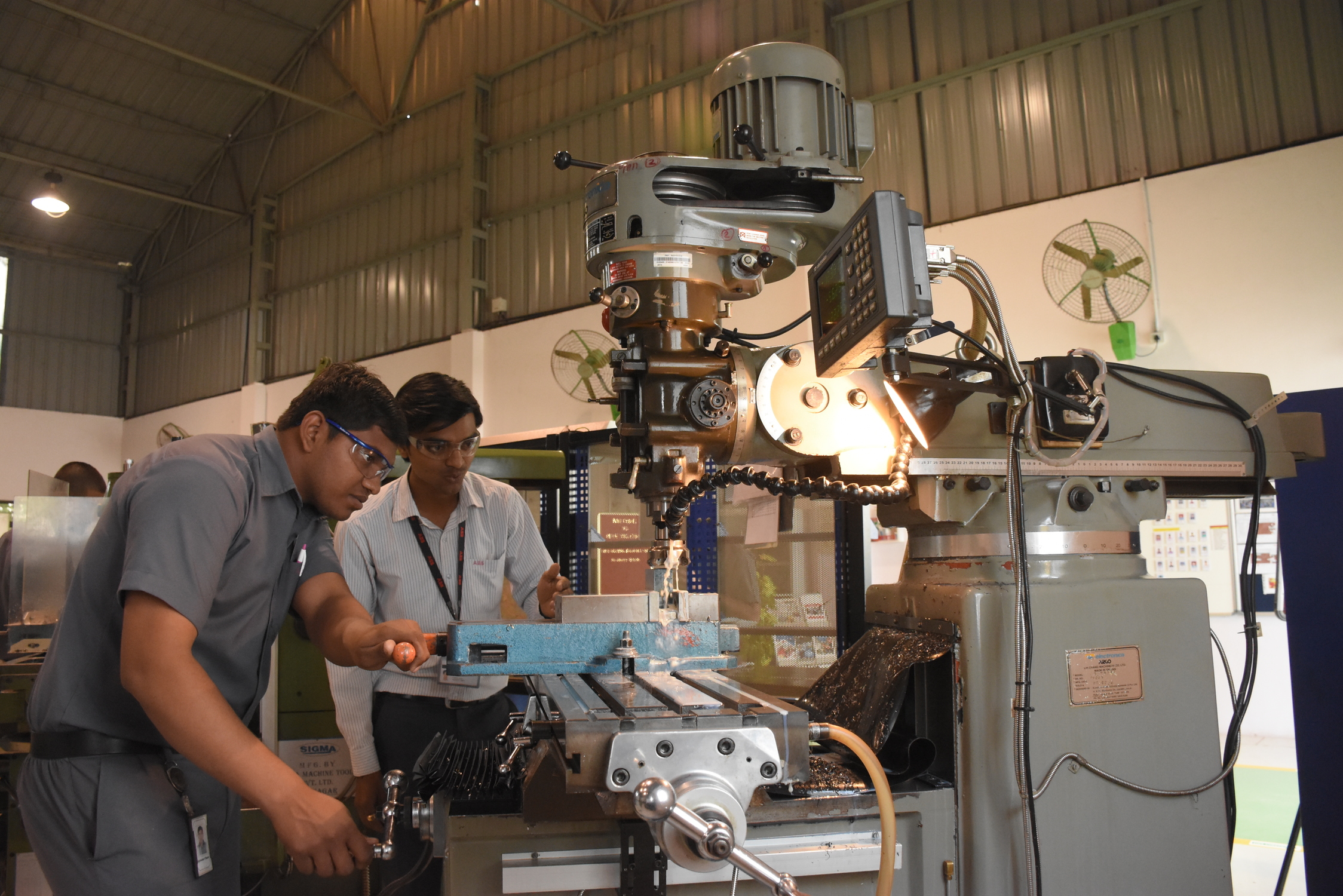CII – Southern Region organized the Indo – Australian Colloquium on Higher Education on 13th March 2018 at ITC Grand Chola, Chennai, on the occasion of the visit of Hon’ble Philip Dalidakis, Minister for Trade and Investment, innovation and Digital Economy and Small Business, State Government of Victoria, Australia. The objective of the colloquium was to strengthen the ties between India and Australia through mutually beneficial exchange of knowledge, expertise and experience in the domain of higher education for inclusive development.
In his welcome address, Mr M Ponnuswami, Chairman – CII Tamil Nadu State Council and Chairman and Managing Director, Pon Pure Chemicals India Pvt. Ltd described the long-term relationship between India and Australia, particularly the State of Victoria and its engagement with southern states of India. He said, “ India and Victoria had a lot to offer to each other and they valued education and joint pursuit of opportunities for youth. India can look up to Australia for advice in innovative policy making in the field of higher education and Vocational Education and Training (VET) and through CII and CII EDU Gateway, there could be a connect to meet the needs of the industry.”
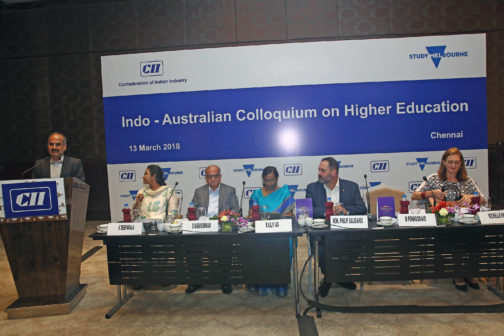
Delivering the thematic address Mr S Narasimhan, Co-Chairman, Affirmative Action Sub Committee, CII – SR & Managing Director, Sattva Logistics Pvt. Ltd presented the Indian perspective of how Australia and the state of Victoria are preferred destination for Indian students. He emphasized on the need for building a good relationship between the two countries and how CII – SR can play a crucial role in learning in the fields of Nano Technology, logistics, Mining, Medical Equipment, Neuroscience where Indian companies are already working and there is scope for growth and bilateral exchange.
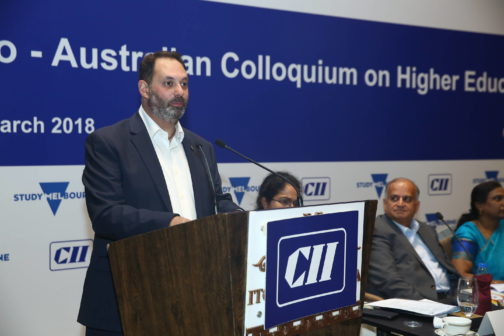 Hon’ble Philip Dalidakis, Minister for Trade and Investment, Innovation and Digital Economy and Small Business, State Government of Victoria, Australia expressed his excitement about his first visit to Chennai and conveyed the significance of outcome-based relationship between India and Australia. Reflecting on why we need to have an empathetic outlook building international relations and drawing a parallel from how we think for our families, he said, “we do what we do because of our children, if it not good enough for our children then we must ask why we are doing it? We need to understand, when students come to Victoria they are provided comfortable environment, and treated just our children, hence it is important to reflect on why we do what we do.” He expressed the need for being vigilant in developing and strengthening trade and commerce. Speaking about how we perceive education, he exhorted the participants to look beyond education since people are defined by the experience that mould them and gaining knowledge is a continuous learning opportunity. He commended the Indian diaspora and student community in Victoria that continues to grow and hoped that there is more to come by way of mutual engagement through inquisitive outlook towards culture and community.
Hon’ble Philip Dalidakis, Minister for Trade and Investment, Innovation and Digital Economy and Small Business, State Government of Victoria, Australia expressed his excitement about his first visit to Chennai and conveyed the significance of outcome-based relationship between India and Australia. Reflecting on why we need to have an empathetic outlook building international relations and drawing a parallel from how we think for our families, he said, “we do what we do because of our children, if it not good enough for our children then we must ask why we are doing it? We need to understand, when students come to Victoria they are provided comfortable environment, and treated just our children, hence it is important to reflect on why we do what we do.” He expressed the need for being vigilant in developing and strengthening trade and commerce. Speaking about how we perceive education, he exhorted the participants to look beyond education since people are defined by the experience that mould them and gaining knowledge is a continuous learning opportunity. He commended the Indian diaspora and student community in Victoria that continues to grow and hoped that there is more to come by way of mutual engagement through inquisitive outlook towards culture and community.
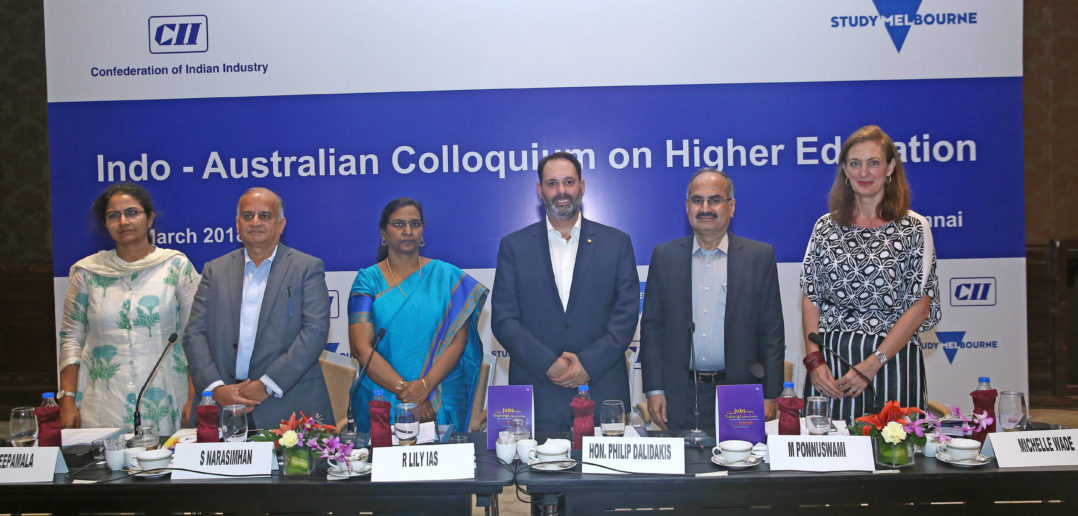 Ms Racquel Shroff, CEO, Global Education Solutions (GES) spoke how her organization has developed partnerships with the government, the industry and the academia in preparing students for future success by enhancing employability. Inspired by the Australian curriculum, GES has been on a journey to resolve skills mismatch through a framework that is being successfully integrated in school curriculum. It also has a digital platform that can be personalized and implemented for training of teachers and helping young people make decisions, be aware of the labour market and understand the world of work for being career-ready. Through Indian Career Education & Development Council (ICEDC), the sustainability initiative from GES, they working closely with the Rotary Club, CII-SR and the Indian Express to widen their impact.
Ms Racquel Shroff, CEO, Global Education Solutions (GES) spoke how her organization has developed partnerships with the government, the industry and the academia in preparing students for future success by enhancing employability. Inspired by the Australian curriculum, GES has been on a journey to resolve skills mismatch through a framework that is being successfully integrated in school curriculum. It also has a digital platform that can be personalized and implemented for training of teachers and helping young people make decisions, be aware of the labour market and understand the world of work for being career-ready. Through Indian Career Education & Development Council (ICEDC), the sustainability initiative from GES, they working closely with the Rotary Club, CII-SR and the Indian Express to widen their impact.
Ms R Lily IAS Additional Secretary to Government, Higher Education Department, Government of Tamil Nadu presented an overview of various initiatives from the government that are connecting education with entrepreneurship in collaboration with the industry. She spoke about the innovative programs being launched through business collaboration center bu designing curriculum that serves mutual interest of the academia and the industry. Laying stress on the quality of technical education she described the interventions from the state government to improvement the quality and outcomes by enhancing the capacity of the institutions. She also quoted examples from Anna University that send top-ranking students abroad for international exposure.
Ms Ravneet Pawha, Deputy Vice President -Global & CEO – Deakin University, South Asia and Prof Aniruddha (Ani) DesaiDirector, Centre for Technology Infusion Latrobe University presented case studies of their institutions by highlighting the unique achievements and scope for collaboration with Indian institutions.
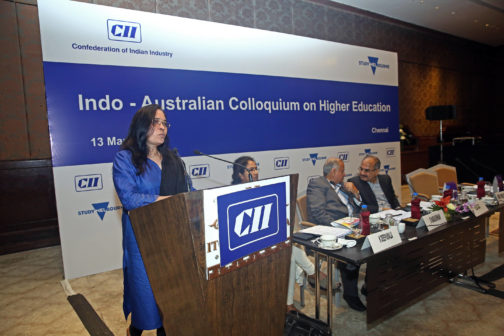 Dr. Madhuri Dubey, Member, CII – Education Sub – Committee, Founder- National Skills Network- NSN, shared the context for the open discussion by presenting some key points. She emphasized the need for inclusive models where India and Australia can collaborate to deepen the social and economic impact through smart use of technology, interdisciplinary curriculum and liberal arts. She described the current focus on building industry-academia relations through CII-SR initiatives and CII EDU Gateway to bridge the skill gaps and enhance the employability of students. She invited the audience to share their observations and suggestions for revising the Approach Paper prepared and shared on this occasion.
Dr. Madhuri Dubey, Member, CII – Education Sub – Committee, Founder- National Skills Network- NSN, shared the context for the open discussion by presenting some key points. She emphasized the need for inclusive models where India and Australia can collaborate to deepen the social and economic impact through smart use of technology, interdisciplinary curriculum and liberal arts. She described the current focus on building industry-academia relations through CII-SR initiatives and CII EDU Gateway to bridge the skill gaps and enhance the employability of students. She invited the audience to share their observations and suggestions for revising the Approach Paper prepared and shared on this occasion.
Dr Deepamala, Director , CII-SR informed the audience about the online platform, CII EDU Gateway and its scope for building sustainable collaboration by connecting educational institutions and bring on board adjunct faculty, research projects, internships for fostering continuous interaction. Referring to the Strategy Paper from Victorian Government for collaboration with India, she said that we need for inclusive models, not only from the industry but from development point of view.
The open discussion centered on how India and Victoria can work together in areas of Sports Management and Sports Science, Nano technology, Molecular and Life sciences and other disciplines.
Mr Vaidyanathan, Member, Education Sub-committee, CII SR &. CEO, Classle Knowledge Pvt. Ltd, summarized the presentations and discussions by reiterating the key points for future collaboration between India and Victoria in the space of Higher Education. Proposing a vote of thanks he wished greater success for the many joint ventures in years to come.




